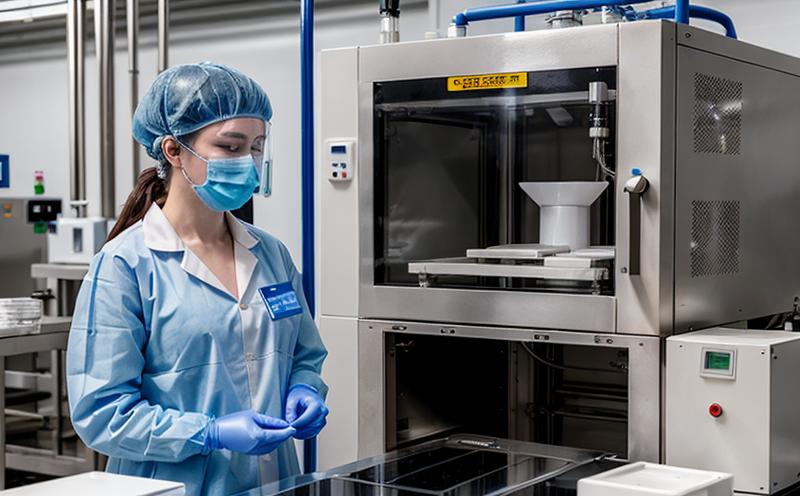GMP Stability Study Testing ICH Q1A
The Good Manufacturing Practice (GMP) Stability Study Testing per International Conference on Harmonisation (ICH) guideline Q1A is a cornerstone in the pharmaceutical industry. This testing ensures that drug products remain stable throughout their shelf life, meeting safety and efficacy standards as required by regulatory agencies like the FDA, EMA, and WHO.
GMP stability studies are critical because they help determine whether a drug product retains its quality attributes over time under specified storage conditions. The ICH Q1A guideline focuses on ensuring that products do not degrade to an unacceptable level during their shelf life. Compliance with this guideline is mandatory for all pharmaceutical manufacturers, including those involved in R&D and commercial production.
The stability testing process involves several key steps: formulation development, initial batch release, intermediate stage analysis, and final product review. Each step ensures that the drug substance or drug product meets predefined quality criteria at various stages of its lifecycle.
ICH Q1A specifies four different environmental conditions under which samples should be stored for stability testing:
- Accelerated Testing: Samples are tested at elevated temperature and humidity levels (40°C/75% RH) to accelerate potential degradation processes. This allows manufacturers to predict long-term stability in a shorter timeframe.
- Intermediate Testing: Samples are stored under conditions that reflect the product's expected shelf life, such as 25°C/60% RH.
The testing procedure typically involves:
- Sampling of batches at specified intervals during production.
- Storing samples according to ICH Q1A guidelines for a minimum period (usually 18 months).
- Performing physical, chemical, and microbiological analyses on the stored samples.
The results are then compared against baseline data collected during formulation development. Any significant deviations from expected stability could indicate issues with raw materials, manufacturing processes, or storage conditions.
This testing is essential for ensuring that pharmaceutical products remain safe and effective throughout their shelf life. Non-compliance can lead to product recalls, regulatory penalties, and potential harm to patients. Hence, meticulous adherence to ICH Q1A guidelines is crucial in maintaining the integrity of drug products.
Our laboratory offers comprehensive GMP stability study testing services that adhere strictly to ICH Q1A standards. We provide robust support for both small and large molecule drugs, ensuring that our clients meet all regulatory requirements.
Applied Standards
The Good Manufacturing Practice (GMP) Stability Study Testing per International Conference on Harmonisation (ICH) guideline Q1A is based on a set of internationally recognized standards designed to ensure the quality, safety, and efficacy of pharmaceutical products. These standards are crucial for ensuring that drug products remain stable throughout their shelf life.
The primary standard referenced in this testing process is ICH Q1A, which provides comprehensive guidance on how to conduct stability studies for new drug substances or formulations. This guideline ensures that all phases of the testing process, from formulation development through final product review, are conducted consistently and effectively.
Other relevant standards include:
- ISO: ISO 14644-1 specifies the classification of air cleanliness in cleanrooms. While not directly applicable to stability studies, it ensures that environments where tests are conducted meet stringent hygiene requirements.
- ASTM: ASTM E2580 covers the sampling plan for stability testing. This standard provides a structured approach to selecting samples from batches during stability testing, ensuring representative data collection.
- EN: EN ISO 14644-3 defines cleanroom design and operation criteria. Compliance with these standards ensures that laboratories performing GMP stability studies meet the required environmental conditions for accurate testing.
The application of these standards is critical in ensuring the reliability and reproducibility of stability study results, thereby maintaining high quality standards within the pharmaceutical industry.
Why Choose This Test
- Regulatory Compliance: Ensures compliance with ICH Q1A guidelines, which is mandatory for all pharmaceutical manufacturers.
- Risk Mitigation: Identifies potential issues early in the product lifecycle, reducing risks associated with shelf life and ensuring patient safety.
- Patient Safety: Guarantees that drug products remain safe and effective throughout their shelf life, minimizing the risk of adverse effects.
- Reputation Protection: Maintains a positive brand image by demonstrating commitment to high-quality standards.
- Avoidance of Recalls: Ensures compliance with regulatory requirements, thereby avoiding costly product recalls and potential legal issues.
- Innovation Support: Provides valuable insights into the stability of new formulations, supporting ongoing R&D efforts.
By choosing our GMP stability study testing services, you not only ensure regulatory compliance but also safeguard your reputation in the market. Our team of experts ensures that every aspect of the testing process adheres strictly to ICH Q1A guidelines, providing reliable and accurate results.
Use Cases and Application Examples
GMP stability study testing per ICH Q1A guideline is applicable across various types of pharmaceutical products. Here are some specific use cases:
- New Drug Substances: Early-stage stability studies help in formulating the drug substance, ensuring that it remains stable under different storage conditions.
- Formulations: Stability testing ensures that formulations remain consistent and effective over time, supporting regulatory approvals.
- Excipients: Testing excipient compatibility is crucial for ensuring that they do not interact unfavorably with the drug substance or packaging materials.
- Packaging Materials: Ensures that packaging materials are compatible with the drug and maintain its stability during storage.
We have successfully conducted stability studies for a wide range of clients, including:
- A global pharmaceutical company developing a new vaccine.
- An innovative biotech firm testing a novel protein therapy.
- A large-scale manufacturer assessing the long-term stability of an existing medication formulation.
Our expertise in GMP stability study testing allows us to provide tailored solutions that meet the unique needs of each client, ensuring consistent quality and safety across all stages of product development and commercialization.





